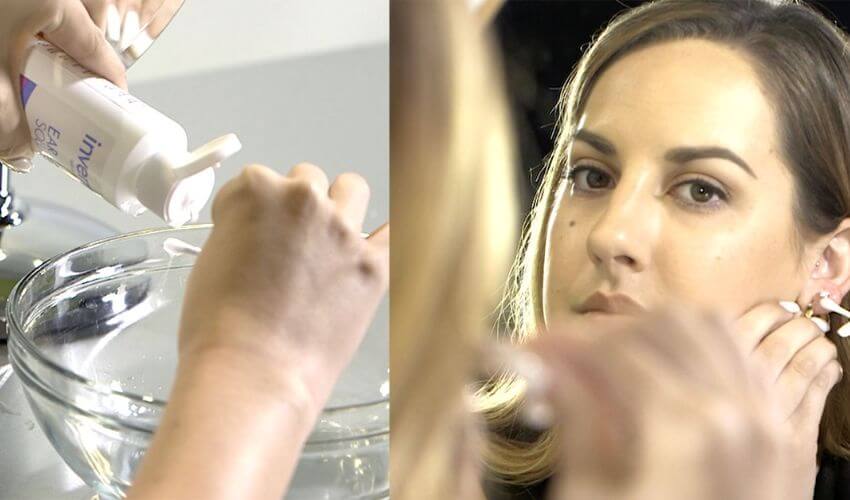Contents
- Find the right studio and get ready
- ✤ Research studios in your area
- ✤ Choose a piercer
- ✤ Get ready for your piercing
- ✤ Bring identification
- ✤ Be prepared to pay
- Types of ear piercing
- ✤ Lobe Piercing
- ✤ Helix Piercing
- ✤ Forward Helix Piercing
- ✤ Industrial Piercing
- ✤ Conch Piercing
- ✤ Tragus Piercing
- ✤ Anti-Tragus Piercing
- Does it hurt to get piercing
- ✤ Pain tolerance varies
- ✤ Location matters
- ✤ Technique matters
- ✤ Aftercare can affect pain
- Looking after your piercing
- ✤ Clean the piercing regularly
- ✤ Avoid touching the piercing
- ✤ Please wait to remove the jewelry
- ✤ Be careful with clothing and accessories
- ✤ Avoid swimming and specific activities
- ✤ Monitor for signs of infection
- What to do with infected piercing
- ✤ Clean the piercing
- ✤ Don’t remove the jewelry
- ✤ Use warm compresses
- ✤ Avoid certain activities
- ✤ Seek medical attention
- How to keep the piercing open without visible jewelry
- ✤ Wear retainers
- ✤ Use silicone discs or O-rings
- ✤ Massage the piercing regularly
- ✤ Keep the area clean
- ✤ Please only go for a short time without wearing jewelry
- How to take care of earrings
- ✤ Clean your earrings regularly
- ✤ Remove your earrings before showering or swimming
- ✤ Store your earrings properly
- ✤ Be mindful of the materials
- ✤ Check for tightness of the earring backs
- Conclusion
Complete Ear Piercing Guide For Men In 2023
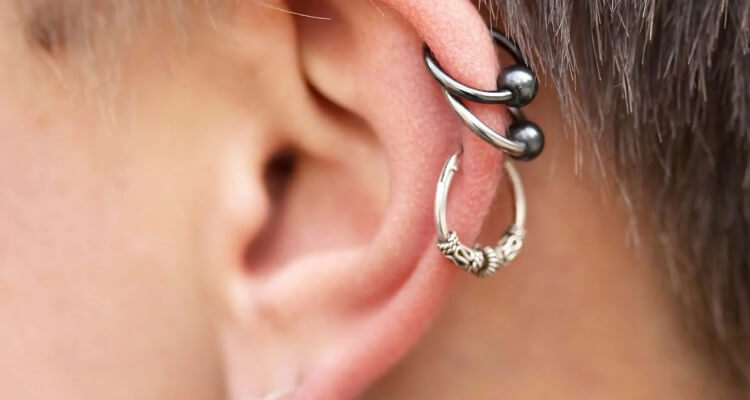
Ear piercings have become increasingly popular in recent years, with more and more men choosing to adorn their ears with various types of jewelry. From simple studs to more elaborate designs, ear piercings can add a unique touch to a man’s style and allow individuals to express themselves creatively through body modification.
However, knowing where to start for those new to ear piercings can be daunting. This complete ear piercing guide for men will provide the information you need to start your ear piercing journey, including choosing a location, selecting a type of piercing, and taking care of your new piercing.
Find the right studio and get ready
Once you have decided to get an ear piercing, the next step is to find the right studio and prepare for your piercing.
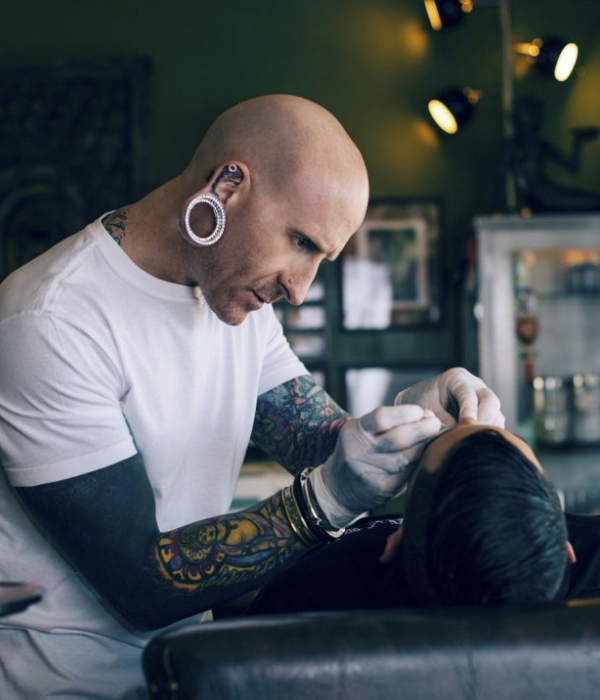
Here are a few suggestions to support you with this process:
✤ Research studios in your area
Take some time to research piercing studios in your area. Look for studios with good reviews and standing for cleanness and dedication. Make sure the studio uses sterile equipment and practices safe piercing techniques.
✤ Choose a piercer
Once you have found a few studios you like, research the individual piercers who work there. Look for a piercer with experience and a portfolio of work you want. You should also feel comfy speaking to the piercer and asking any questions.
✤ Get ready for your piercing
Before your appointment, confirm you are fresh, with good sleep, and have eaten. It would help if you also evaded liquor and anti-clotting medicines 24 hours preceding your arrangement. Wear comfy clothes that will not rub against your new piercing.
✤ Bring identification
Most piercing studios require a document of ID, like a driving permit or any other official document. Assure to get this with you to your arrangement.
✤ Be prepared to pay
Ear piercings can range in price relying on the spot and kind of piercing. Ensure you have enough money to pay for your piercing and any aftercare products you may need.
Following these tips, you can find the proper studio and prepare for your ear piercing. Remember to take your time and choose a piercer you feel comfortable with, as this will ensure a safe and enjoyable piercing experience.
Types of ear piercing
There are many ear piercings for men, each with a unique style and placement.
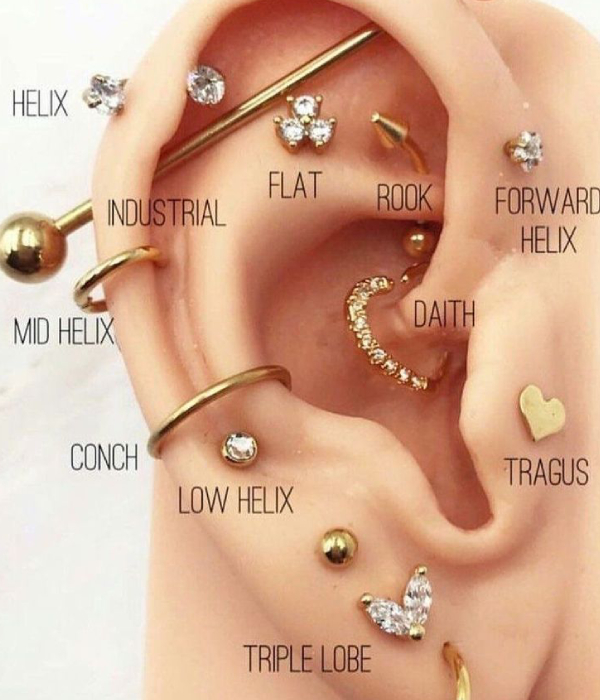
Here are a few of the famous styles of ear piercings:
✤ Lobe Piercing
Lobe piercing is a very familiar and popular ear piercing for men. It is located on the fleshy lower part of the earlobe and is the easiest and least painful piercing to get. It can be ornamented with straight studs or hoop earrings.
✤ Helix Piercing
The helix piercing is located on the ear’s outer rim and can be placed anywhere along the cartilage. This piercing is often adorned with a stud, hoop, or captive bead ring.
✤ Forward Helix Piercing
The forward helix piercing is located on the cartilage near the front of the ear, just above the lobe. It can be ornamented with a small stud or hoop earring.
✤ Industrial Piercing
Industrial piercing combines two piercings connected with a barbell. One piercing is located in the helix, and the other is in the forward helix. This piercing is often adorned with a unique barbell or chain earring.
✤ Conch Piercing
The conch piercing is in the middle of the ear’s cartilage, just above the ear canal. It can be ornamented with a bead or hoop earring.
✤ Tragus Piercing
Tragus piercing is located on the small, triangular flutter of cartilage that covers the auditory canal. It is often adorned with a small stud or hoop earring.
✤ Anti-Tragus Piercing
The anti-tragus piercing is opposite the tragus piercing on the outer edge of the ear cartilage. This piercing can be adorned with a small stud or hoop earring.
These are just some of the ear piercings available for men. When choosing a piercing, consider your style, comfort level, and the healing time and aftercare required for each piercing.
Does it hurt to get piercing
Getting an ear piercing can cause some discomfort, but the pain level varies depending on the individual and the type of piercing.
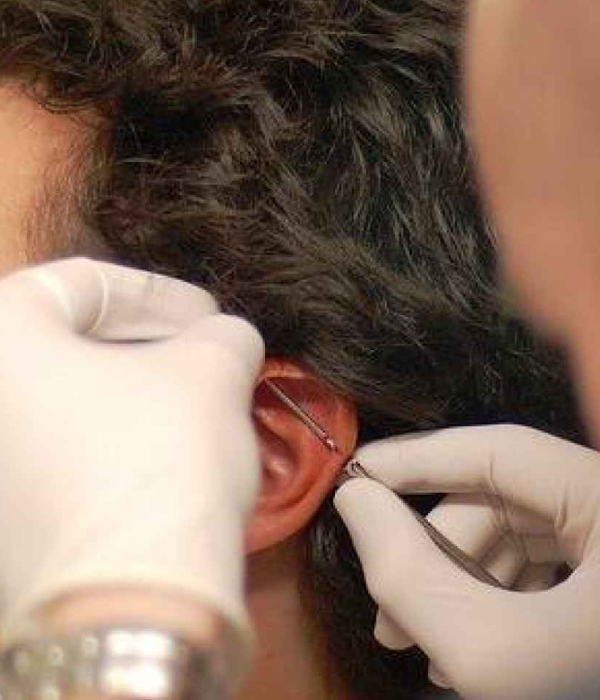
Here are a few things to hold in intellect when it comes to the pain of getting a piercing:
✤ Pain tolerance varies
Everyone’s pain tolerance is different, so what one person experiences as a minor discomfort may be more painful for someone else. Factors like the individual’s age, general health, and stress level can all affect pain perception.
✤ Location matters
The location of the piercing also affects the level of pain. Piercings on the fleshy ear parts, like the lobes, tend to be less painful than piercings on the cartilage. Yet, this can differ relying on the person and their pain tolerance.
✤ Technique matters
The method used by the piercer can also affect the level of pain. A skilled piercer will utilize the proper approach to minimize pain and discomfort during the piercing process.
✤ Aftercare can affect pain
The aftercare routine can also affect the pain level during the healing process. Following proper aftercare instructions can minimize discomfort and promote healing.
An ear piercing may cause discomfort but is usually a quick and temporary sensation. The pain level can be minimized by choosing a skilled piercer, following proper aftercare instructions, and being mindful of individual pain tolerance.
Looking after your piercing
After getting an ear piercing, taking good care of it is essential to ensure proper healing and prevent infection.
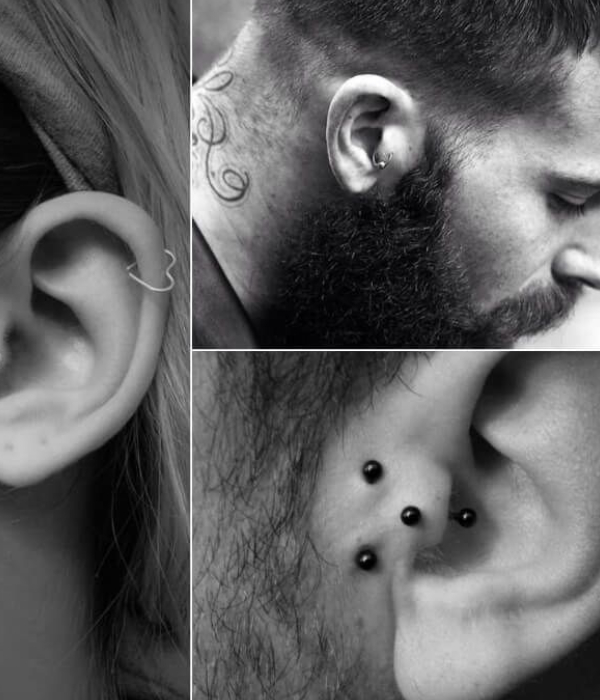
Here are a few suggestions for looking after your piercing:
✤ Clean the piercing regularly
Gently clean the piercing and surrounding area with saline solution or an antibacterial soap twice daily. Evade utilizing harsh or perfumed items that can irritate the piercing.
✤ Avoid touching the piercing
Evade touching the piercing with dirty hands or fingers, which may present germs and raise the chance of inflammation. Just touch the piercing when purifying it, and be gentle.
✤ Please wait to remove the jewelry
Keeping the initial jewelry in place for the recommended time is essential to ensure proper healing. Removing the jewelry too soon can cause the piercing to close up or become infected.
✤ Be careful with clothing and accessories
Avoid wearing clothing or accessories that can rub against or catch on the piercing, such as tight-fitting shirts or scarves. Be cautious when brushing your hair or using headphones around the piercing.
✤ Avoid swimming and specific activities
Avoid swimming and activities that involve contact with water, such as soaking in a hot tub, for at least the first few weeks after getting a piercing. Avoid excessive sweating, like working out, until the piercing is fully healed.
✤ Monitor for signs of infection
Observe for symptoms of infection, like inflammation, bulge, and discharge. If you detect any of these signs, pursue the doctor’s advice and follow the advice of your healthcare provider.
Following these tips and being patient, your ear piercing will heal properly, and you can enjoy your new accessory for years.
What to do with infected piercing
If you suspect your ear piercing may be infected, immediately preventing further complications is essential.
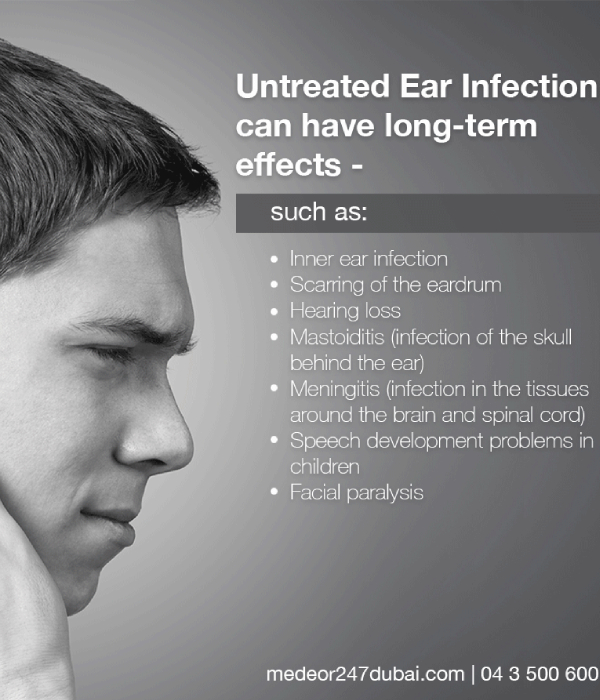
Here are some steps you can take if you feel your piercing might be infection-prone:
✤ Clean the piercing
Clean the piercing with a saline solution or antibacterial soap as directed by your piercer or healthcare provider. Be gentle and avoid further irritating the area.
✤ Don’t remove the jewelry
Do not remove the jewelry from the infected piercing, as this can cause the hole to close and trap the infection inside. Removing the jewelry can also make it more difficult for a healthcare provider to treat the infection properly.
✤ Use warm compresses
Use warm compresses to help alleviate pain and swelling. Soak a clean cloth in warm water and apply it to the infected area for 5-10 minutes several times daily.
✤ Avoid certain activities
Avoid swimming, soaking in hot tubs, and engaging in activities that may cause the piercing to become further irritated or infected.
✤ Seek medical attention
If the infection does not improve within a few days or symptoms worsen, seek medical attention from a healthcare provider. They may specify an ointment or oral antibiotics to support the removal of the bacteria.
Generally, taking good care of your piercing and watching for any signs of infection is essential. Following proper aftercare procedures and seeking medical attention can help ensure your piercing heals appropriately and stays healthy.
How to keep the piercing open without visible jewelry
If you have an ear piercing that you want to stay open but don’t want to wear visible jewelry.
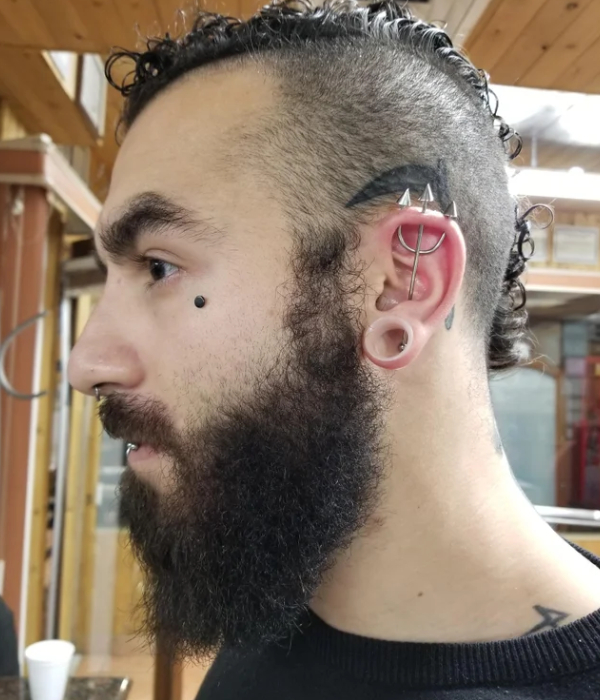
there are a few things you can do to maintain the piercing:
✤ Wear retainers
Retainers are clear or flesh-colored jewelry that can be worn instead of traditional earrings. They are designed to be nearly invisible and are an excellent option for those who want to maintain their piercings without drawing attention to them.
✤ Use silicone discs or O-rings
Silicone discs or O-rings can be placed on the backs of traditional earrings to keep them in place and prevent them from falling out. These can be a good option if you want to wear earrings occasionally but want them to be visible only some of the time.
✤ Massage the piercing regularly
Massaging the piercing with clean hands can help to stimulate blood flow and prevent the hole from closing up. Be sure to clean your hands thoroughly before touching the piercing, and be gentle to avoid irritation.
✤ Keep the area clean
Even if you’re not wearing visible jewelry, keeping the area around the piercing clean is essential to prevent infection and promote healing. Use a saline solution or antibacterial soap to clean the area as directed by your piercer or healthcare provider.
✤ Please only go for a short time without wearing jewelry
While it’s possible to maintain a piercing without visible jewelry, it’s essential to wear earrings occasionally to prevent the hole from closing completely. Aim to wear earrings at least once a week to keep the piercing open.
By pursuing these suggestions, you can protect your ear piercing without having to wear visible jewelry all the time. Remember to keep the area clean, wear jewelry occasionally, and gently massage the piercing jewelry to avoid irritation.
How to take care of earrings
Earrings are a popular accessory that can add a touch of style to any outfit. To ensure that your earrings stay looking great and don’t cause any irritation or infection, it’s essential to take good care of them.
Here are a few tips for caring for your earrings:
✤ Clean your earrings regularly
Regular cleaning is vital to prevent the buildup of dirt, sweat, and other debris on your earrings. Use a gentle, neat material to clean your earrings after each wear. You can also clean your earrings with identical parts of water and liquor.
✤ Remove your earrings before showering or swimming
Exposure to water can cause damage to your earrings over time, especially if they are made of certain materials like sterling silver or gold-plated metal. To prevent this, take off your earrings prior to bathing or swimming.
✤ Store your earrings properly
Store your earrings in a dry, clean place, away from direct sunlight and other heat sources. You can keep them in a hope chest or a dedicated earring holder. Make sure to keep pairs together and avoid tangling.
✤ Be mindful of the materials
Some people may be sensitive to certain materials used in earrings, such as nickel or copper. If you have sensitive skin, opt for earrings made of hypoallergenic materials such as surgical steel or titanium.
✤ Check for tightness of the earring backs
Earring backs can become loose over time and fall off, potentially losing the earring. To prevent this, check the tightness of the earring backs periodically and replace them if necessary.
Following these tips, you can keep your earrings looking great and avoid irritation or infection. Take adequate maintenance for your earrings; so they continue to be stylish accessories for years.
Conclusion
Getting an ear piercing can be a stylish way for men to express themselves and add some edge to their looks. Whether you choose a simple stud or a more elaborate design, it’s essential to take good care of your piercing to ensure it heals properly and stays healthy. Our complete piercing guide for men will provide all the required knowledge.
From finding the proper piercing studio to choosing the best type of jewelry and caring for your piercing after it’s done, there are many steps involved in the process. However, with some knowledge and careful attention, you can enjoy your new piercing and confidently show it off. Forever pay attention to your health and pursue medical care if you notice any signs of infection or discomfort. Happy piercing!

